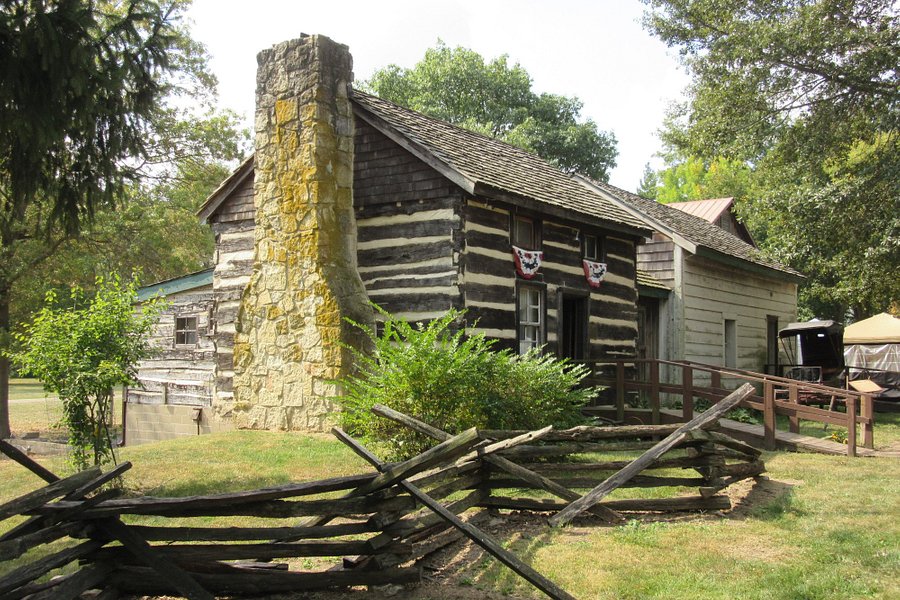Clayville Historic Site, Illinois, United States
5.0 (4 reviews) Spent 2-3 hours Ranking #1 in Pleasant Plains Historic Sites • Points of Interest & Landmarks • Cemeteries • Monuments & Statues • Ghost Towns

A well spent afternoon
My wife and I visited Clayville on April 18, 2017. Having never been there, we didn't know what to expect. We were more than pleasantly surprised! Besides the old Broadwell Inn stagecoach stop, there were several other structures. All had fascinating histories, which were explained in great detail by our very knowledgeable guide (a retired history whose name escapes me). The Pleasant Plains Historical Society not only lovingly restored the old inn, but they brought in other historic structures from around Illinois to reconstruct the village. The site also has a very good agricultural museum in and old barn filled with artifacts dating to the early-middle 1800s (including one from the Donner party!). Clayville is MUST SEE for all history lovers and it's only 13 miles NW of Springfield. Don't miss it!
Address
125 County Highway 9C, Pleasant Plains, IL 62677
Mobile
Website
http://clayville.org
Current local date and time now
Thursday, May 09, 2024, 17:54
User Ratings
5.0 based on (4 reviews)
Reviews
-
5Taylor B 5:00 PM Sep 7, 2016
Broadwell Tavern still stands
There are hundreds of ghost towns in Colorado, mostly remnants of the Gold Rush era. But there are ghost towns in Illinois, too. One noteworthy site is Old Shawneetown on the Ohio River near Metropolis. Another is Clayville, which was located in Cartwright Township near Pleasant Plains, on the main road between Springfield and the Illinois River port of Beardstown. Today, all that remains of the former frontier hamlet that was inhabited from 1824 into the 1850s, is the Broadwell Tavern. Innkeeper and land developer John Broadwell built the tavern in 1824 as an investment in the Springfield area. He sensed that Springfield would grow (It became Illinois' permanent state capital in 1837) and its residents would need to travel in and out. In the 1830s, a tavern typically doubled as a logistics center. In the 1830s and early 1840s, the Sangamon River Valley was connected with steamboat traffic on the Illinois River by stagecoaches, which needed places to stop for food, sleep, water and other beverages. The tavern featured a first-floor kitchen and barroom while the second floor had bedrooms. Broadwell named the town after a political hero, Henry Clay. In fact, Broadwell's admiration for Clay drew him towards a fellow local admirer of the Kentucky politician, Abraham Lincoln. Legal records reveal that Broadwell retained Lincoln as his counsel on four separate occasions. In 1847, Broadwell sold the tavern and the coming of the railroad to central Illinois in the 1850s eliminated the need for taverns. The stagecoach road became Illinois Route 125 in the early 1900s and Clayville ceased to exist. Only the abandoned brick tavern survived. Several attempts to restore the tavern failed despite the fact that Broadwell Tavern was added to the National Register of Historic Places in 1973. Finally, in 2009, residents of nearby Pleasant Plains organized preservation efforts. As of 2015, the Clayville Historic Site came into being. Festivals in the spring and fall, a summer folk music festival and a haunted house festival at the ghost townsite have helped to restore the tavern to its original appearance in the 1840s. There doesn't appear to be any evidence but it is hard to imagine that Lincoln, the young lawyer, didn't stop at Broadwell Tavern on more than one occasion on his circuit trips. Maybe not. But it's worth pausing to think about as you walk the grounds.
-
5Taylor B 5:00 PM Jun 27, 2015
Another "ghost town" in Illinois
After visiting Lincoln's New Salem near Petersburg, a community that was founded in 1829 and abandoned by 1840, we were intrigued by an opportunity to visit another nearby ghost town, Clayville, a former roadside hamlet near Pleasant Plains that was inhabited from 1924 into the 1850s. The settlement was never large but was firmly centered on a once-thriving tavern on the main road between Springfield, the state capital, and the Illinois River port of Beardstown. Today, the Boardwell Tavern continues to stand on its original foundation as a reminder of the once-active frontier settlement. It was constructed by the Broadwell family as a stagecoach stop in 1824. The inn is the oldest brick building in Sangamon County. Listed on the National Register of Historic Places, the inn is surrounded by numerous other historic buildings from central Illinois that were moved to Clayville in the 1960s to recreate an early frontier pioneer village. A very young Abraham Lincoln once boarded with Charles Broadwell while building the raft that carried him first to New Salem and then to New Orleans. While there is no evidence that Lincoln ever spent time in the Broadwell Inn, it seems almost certain that he would have as he traveled the road to Virginia, Beardstown and beyond many times on the circuit as an attorney. He represented Broadwell in at least four cases. The site deteriorated over the years. In 1992, it was sold into private ownership. In 2007, it was declared one of the 10 most endangered historic sites in Illinois. In 2009, led by Jim Verkuilen, the Pleasant Plains Historical Society was formed with the purpose of purchasing and saving the Clayville Historic Site. It was finalized the following year. In 2012, Landmarks Illinois, the organization that had declared the site to be one of the most endangered sites in Illinois, awarded the Pleasant Plains Historical Society its advocacy award for saving the site. Today, the site operates an annual spring festival, summer folk music event, a fall festival and a haunted house festival. And officials have refitted the Broadwell Tavern to restore the exterior and partly restore the interior to its operational appearance in the 1840s.